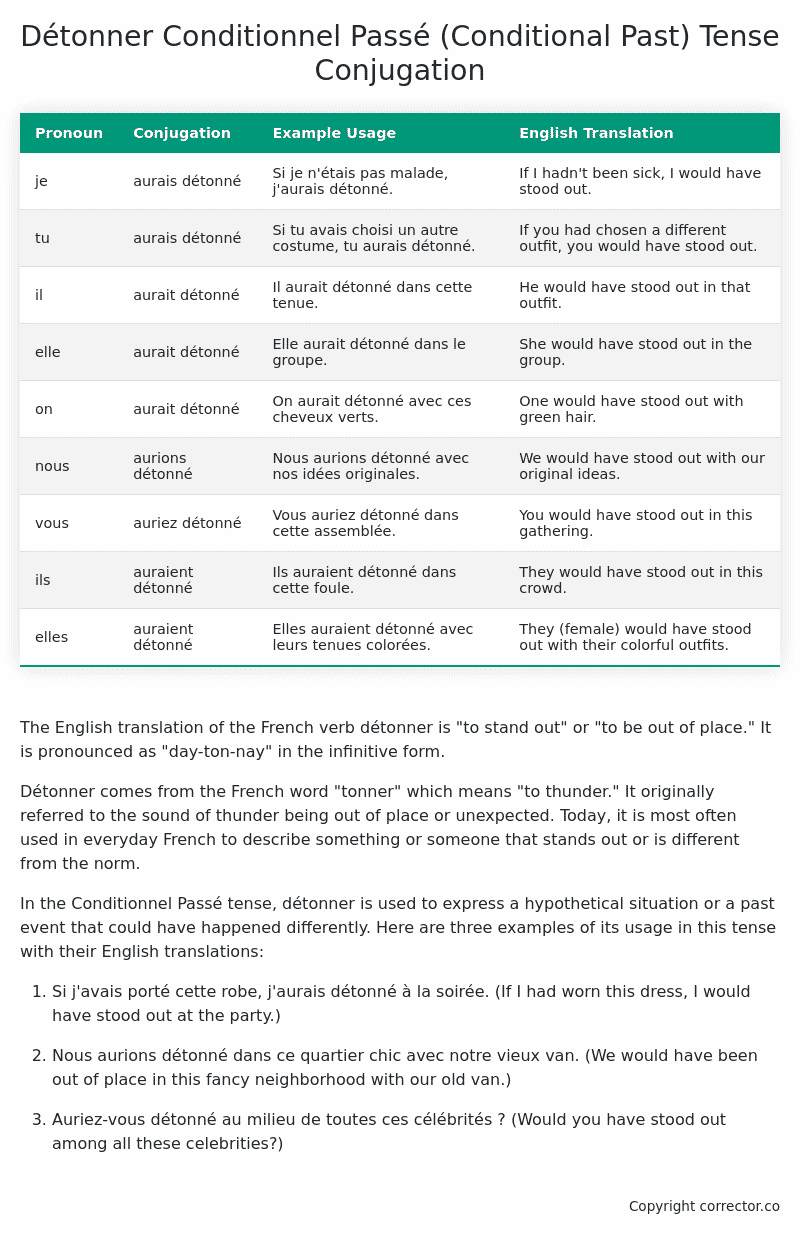Conditionnel Passé (Conditional Past) Tense Conjugation of the French Verb détonner
Introduction to the verb détonner
The English translation of the French verb détonner is “to stand out” or “to be out of place.” It is pronounced as “day-ton-nay” in the infinitive form.
Détonner comes from the French word “tonner” which means “to thunder.” It originally referred to the sound of thunder being out of place or unexpected. Today, it is most often used in everyday French to describe something or someone that stands out or is different from the norm.
In the Conditionnel Passé tense, détonner is used to express a hypothetical situation or a past event that could have happened differently. Here are three examples of its usage in this tense with their English translations:
-
Si j’avais porté cette robe, j’aurais détonné à la soirée. (If I had worn this dress, I would have stood out at the party.)
-
Nous aurions détonné dans ce quartier chic avec notre vieux van. (We would have been out of place in this fancy neighborhood with our old van.)
-
Auriez-vous détonné au milieu de toutes ces célébrités ? (Would you have stood out among all these celebrities?)
Table of the Conditionnel Passé (Conditional Past) Tense Conjugation of détonner
| Pronoun | Conjugation | Example Usage | English Translation |
|---|---|---|---|
| je | aurais détonné | Si je n’étais pas malade, j’aurais détonné. | If I hadn’t been sick, I would have stood out. |
| tu | aurais détonné | Si tu avais choisi un autre costume, tu aurais détonné. | If you had chosen a different outfit, you would have stood out. |
| il | aurait détonné | Il aurait détonné dans cette tenue. | He would have stood out in that outfit. |
| elle | aurait détonné | Elle aurait détonné dans le groupe. | She would have stood out in the group. |
| on | aurait détonné | On aurait détonné avec ces cheveux verts. | One would have stood out with green hair. |
| nous | aurions détonné | Nous aurions détonné avec nos idées originales. | We would have stood out with our original ideas. |
| vous | auriez détonné | Vous auriez détonné dans cette assemblée. | You would have stood out in this gathering. |
| ils | auraient détonné | Ils auraient détonné dans cette foule. | They would have stood out in this crowd. |
| elles | auraient détonné | Elles auraient détonné avec leurs tenues colorées. | They (female) would have stood out with their colorful outfits. |
Other Conjugations for Détonner.
Le Present (Present Tense) Conjugation of the French Verb détonner
Imparfait (Imperfect) Tense Conjugation of the French Verb détonner
Passé Simple (Simple Past) Tense Conjugation of the French Verb détonner
Passé Composé (Present Perfect) Tense Conjugation of the French Verb détonner
Futur Simple (Simple Future) Tense Conjugation of the French Verb détonner
Futur Proche (Near Future) Tense Conjugation of the French Verb détonner
Plus-que-parfait (Pluperfect) Tense Conjugation of the French Verb détonner
Passé Antérieur (Past Anterior) Tense Conjugation of the French Verb détonner
Futur Antérieur (Future Anterior) Tense Conjugation of the French Verb détonner
Subjonctif Présent (Subjunctive Present) Tense Conjugation of the French Verb détonner
Subjonctif Passé (Subjunctive Past) Tense Conjugation of the French Verb détonner
Subjonctif Imparfait (Subjunctive Imperfect) Tense Conjugation of the French Verb détonner
Subjonctif Plus-que-parfait (Subjunctive Pluperfect) Tense Conjugation of the French Verb détonner
Conditionnel Présent (Conditional Present) Tense Conjugation of the French Verb détonner
Conditionnel Passé (Conditional Past) Tense Conjugation of the French Verb détonner (this article)
L’impératif Présent (Imperative Present) Tense Conjugation of the French Verb détonner
L’infinitif Présent (Infinitive Present) Tense Conjugation of the French Verb détonner
Struggling with French verbs or the language in general? Why not use our free French Grammar Checker – no registration required!
Get a FREE Download Study Sheet of this Conjugation 🔥
Simply right click the image below, click “save image” and get your free reference for the détonner Conditionnel Passé tense conjugation!

Détonner – About the French Conditionnel Passé (Conditional Past) Tense
Formation
Common Everyday Usage Patterns
Expressing Unreal Past Scenarios
Polite Requests or Suggestions
Expressing Doubt or Uncertainty
Interactions with Other Tenses
Conditional Present
Indicative Past Tenses
Conditional Future
Summary
Want More?
I hope you enjoyed this article on the verb détonner. Still in a learning mood? Check out another TOTALLY random French verb conjugation!


